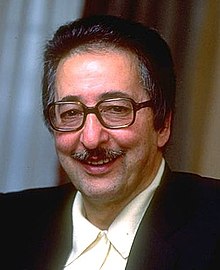Abolhassan Banisadr | |
|---|---|
| ابوالحسن بنیصدر | |
 Official portrait, 1974 | |
| 1st President of Iran | |
| In office 4 February 1980 – 21 June 1981 | |
| Supreme Leader | Ruhollah Khomeini |
| Prime Minister | Mohammad-Ali Rajai |
| Preceded by | Office established |
| Succeeded by | Mohammad-Ali Rajai |
| Head of Council of the Islamic Revolution | |
| In office 7 February 1980[1] – 20 July 1980 | |
| Preceded by | Mohammad Beheshti[1] |
| Succeeded by | Office abolished |
| Minister of Foreign Affairs Acting | |
| In office 12 November 1979 – 29 November 1979 | |
| Appointed by | Council of the Revolution |
| Preceded by | Ebrahim Yazdi |
| Succeeded by | Sadegh Ghotbzadeh |
| Minister of Economic Affairs and Finance | |
| In office 17 November 1979 – 10 February 1980 | |
| Appointed by | Council of the Revolution |
| Preceded by | Ali Ardalan |
| Succeeded by | Hossein Namazi |
| Member of the Assembly of Experts for Constitution | |
| In office 15 August 1979 – 15 November 1979 | |
| Constituency | Tehran Province |
| Majority | 1,752,816 (69.4%) |
| Personal details | |
| Born | 22 March 1933 Hamadan, Imperial State of Persia |
| Died | 9 October 2021 (aged 88) Paris, France |
| Political party | Independent |
| Other political affiliations |
|
| Spouse |
Ozra Hosseini (m. 1961) |
| Children | 3 |
| Alma mater | University of Tehran Sorbonne University |
| Signature |  |
Abolhassan Banisadr (Persian: سید ابوالحسن بنیصدر; 22 March 1933 – 9 October 2021) was an Iranian politician, writer, and political dissident. He was the first president of Iran after the 1979 Iranian Revolution abolished the monarchy, serving from February 1980 until his impeachment by parliament in June 1981. Prior to his presidency, he was the Minister of Foreign Affairs in the Interim Government.
Following his impeachment, Banisadr fled Iran and found political asylum in France, where he co-founded the National Council of Resistance of Iran. Banisadr later focused on political writings about his revolutionary activities and his critiques of the Iranian government. He became a critic of Supreme Leader Ali Khamenei and the country's handling of its 2009 elections.
- ^ a b Barseghian, Serge (February 2008). "مجادلات دوره مصدق به شورای انقلاب کشیده شد". Shahrvand Weekly (36). Institute for humanities and cultural studies.
- ^ Houchang E. Chehabi (1990). Iranian Politics and Religious Modernism: The Liberation Movement of Iran Under the Shah and Khomeini. I.B.Tauris. p. 200. ISBN 978-1850431985.